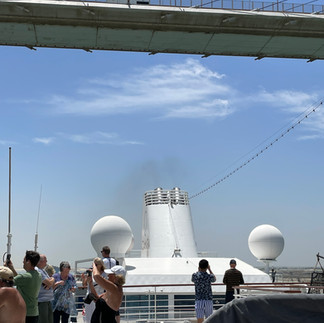We had been anchored overnight; the Captain will be advised some time after 4am when he can start the transit through the Suez Canal. I wake at about 4, but we are still anchored and not moving. I see lights on the horizon, so we are not far from land and there are several ships also anchored, mostly cargo and freighters.
The next time I wake up, it is light and we are steaming ahead. I sit on the balcony and watch the activity on the shore a short way away. I am amused to see a rowboat filled with young people rowing towards us.
'Hello,' they yell as they disappear between the back of our ship and the front of the tug boat, which has been allocated to follow us.
The passage is quite narrow and there are several ships in front and behind us. Beyond the piles of sand and retaining walls villages line the sides of the canal. Every now and them I hear shouts of 'Hello' from the sides. I don't think there are too many passenger ships transiting the Suez Canal these days.
By 6:30am, we exit this part of the canal and enter Great Bitter Lake, which was a dry salt valley before the canal was built in 1869. Today, the lake is used as a passing lane for ships as they assemble in the queue to complete the transit. Unlike the Panama Canal, there are no locks as the levels of the Red Sea and Mediterranean Sea are similar. Many fishing boats are working in the lake. I suppose the fish are easy to catch here since the water is turbulent from the movement of the ships.
There is a lot of infrastructure work happening along both banks of the canal. The Egyptians have been working on building a second lane, which now extends to almost the entire length after the exit from Great Bitter Lake. As well as the second lane, there are massive swing bridges, roads, and more being built.
We sit at the front of the ship, which provides a lofty view of our passage through the canal. We have a great spot to view the crossing. Unfortunately, we do not have a commentary on the crossing like we did when we went through the Panama Canal. I think I would have liked the commentary, after all, the transit of Suez Canal is the reason we are here today.
We exit the canal at Port Said just before 3pm. It has cost $410 per person to transit the Suez Canal, and the tug boat, which has tailed us all day cost $35,000. A couple of days later, we will hear that a cargo ship ran aground, blocking the canal for several hours. Today's crossing has been without hiccups and as we steam into the Mediterranean following the Asian coast, I look forward to our next stop in Ashdod, Israel.











Comments